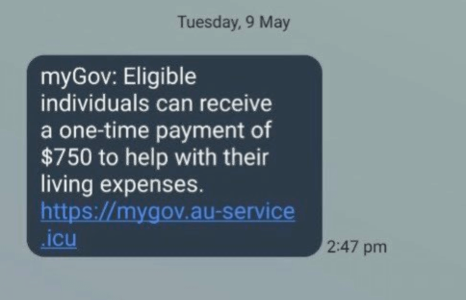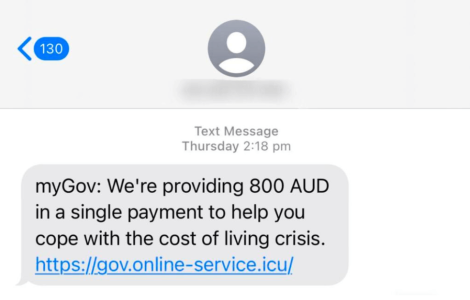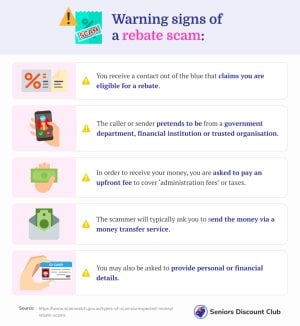Scammers set their sights on struggling Australians with budget-related text message scams: ‘Don't click on any links’
- Replies 5
The threat of money-hungry scammers is becoming more alarming than ever before, and unfortunately, it's the most vulnerable individuals in society who are being targeted.
With many Aussies already struggling due to the cost of living crisis, these fraudsters are now preying on innocent people with text message scams that could leave them in dire financial straits.
These deceitful messages contain links that give the scammers access to your hard-earned money. According to Stephen Jones, the Assistant Treasurer and Financial Services Minister, these scams are already in motion, and individuals need to be vigilant.
Jones warns that individuals should not click on any links within these texts, as they could lead to a significant loss of money. It's important to note that any messages from myGov will always be sent to your myGov inbox, so be cautious of any messages that appear outside of this platform.
We urge you to take this matter seriously and spread the word to those around you. It's vital that we protect ourselves and others from falling victim to these heartless scams.

The Australian Competition and Consumer Commission's (ACCC) Scamwatch organisation is raising the alarm on rebate scams, where fraudsters trick people into thinking they are entitled to reimbursements from the government or tax office. Sadly, this is a common tactic used by cybercriminals to steal money from innocent individuals.
The ACCC has now issued a warning to Australians to be extra cautious, as these scams may also promise payments from the government following the announcement of the 2023 Federal Budget. While the government has announced several measures to assist those struggling with inflation, it's important to note that none of these assistance packages will be distributed via text message.
In a recent incident, a person shared a screenshot of a fraudulent text message they received, offering a one-off myGov payment of $800 to help with the cost of living. The message contained a fake URL, which pretended to be a government website but was actually a trap to extract personal information from unsuspecting recipients.
The sender aimed to lure people into sharing their personal information, which could then be used for malicious purposes. Unfortunately, many people are likely to fall victim to this scam, as the message looks convincing and the offer of financial support is appealing to those struggling with the cost of living.
Click here to read the full article.

In a bid to support Australians struggling financially, the government is hoping to pass a change that would increase welfare payments by $40 a fortnight from September.
This boost will apply to over 1.1 million individuals who receive payments such as JobSeeker, Youth Allowance, Parenting Payment (partnered), ABSTUDY, Disability Support Pension (Youth) and Special Benefit.
Furthermore, around 57,000 single parents will see an increase in their payments, with an additional $176.90 per fortnight. The Labor party has also lifted the age cut-off that previously resulted in payment reductions for parents whose child had turned 8. Single parents will now receive the benefit until their child reaches the age of 14.
Additionally, the government has entered into an agreement with the states to provide energy bill relief to more than five million households. However, this relief will not come in the form of cash or payments but will be applied directly to power bills as credits.
Those eligible for relief include pensioners, senior cardholders, and recipients of family tax benefits A and B. The amount received will vary depending on which state the individual resides in.

Australians are being cautioned about an increased risk of cyber attacks during the tax season. Tax-related scams are a common threat during this time of the year, and many people fall victim to these malicious attacks.
According to new research from the Commonwealth Bank (CBA), one in four Australians (24 per cent) has already been targeted by a scam related to EOFY or tax matters.
While people typically begin filing their tax returns towards the end of June, fraud experts are warning that cyber criminals do not necessarily wait until then to find their victims. They could strike at any time, which is why it's essential to remain vigilant throughout the year.
Always verify the legitimacy of any emails, text messages, or phone calls related to taxes or finances. Don't provide any personal information to unsolicited or suspicious sources, and report any potential scams immediately.
Have you or someone you know fallen victim to a text message scam? How did you handle it, and what measures did you take to safeguard yourself in the future? Do you have any additional tips or advice to share with others about staying safe from cyber attacks and scams? Share your thoughts and experiences in the comments section below.
Remember, with a little bit of awareness and caution, we can prevent these fraudulent activities from causing harm to our lives and finances. Stay safe and informed, and keep a watchful eye out for potential scams and cyber threats.
With many Aussies already struggling due to the cost of living crisis, these fraudsters are now preying on innocent people with text message scams that could leave them in dire financial straits.
These deceitful messages contain links that give the scammers access to your hard-earned money. According to Stephen Jones, the Assistant Treasurer and Financial Services Minister, these scams are already in motion, and individuals need to be vigilant.
Jones warns that individuals should not click on any links within these texts, as they could lead to a significant loss of money. It's important to note that any messages from myGov will always be sent to your myGov inbox, so be cautious of any messages that appear outside of this platform.
We urge you to take this matter seriously and spread the word to those around you. It's vital that we protect ourselves and others from falling victim to these heartless scams.

Scammers are using this year's federal budget to steal money from struggling Australians via text messages containing hyperlinks. Credit: Twitter/StephenJonesMP.
The Australian Competition and Consumer Commission's (ACCC) Scamwatch organisation is raising the alarm on rebate scams, where fraudsters trick people into thinking they are entitled to reimbursements from the government or tax office. Sadly, this is a common tactic used by cybercriminals to steal money from innocent individuals.
The ACCC has now issued a warning to Australians to be extra cautious, as these scams may also promise payments from the government following the announcement of the 2023 Federal Budget. While the government has announced several measures to assist those struggling with inflation, it's important to note that none of these assistance packages will be distributed via text message.
In a recent incident, a person shared a screenshot of a fraudulent text message they received, offering a one-off myGov payment of $800 to help with the cost of living. The message contained a fake URL, which pretended to be a government website but was actually a trap to extract personal information from unsuspecting recipients.
The sender aimed to lure people into sharing their personal information, which could then be used for malicious purposes. Unfortunately, many people are likely to fall victim to this scam, as the message looks convincing and the offer of financial support is appealing to those struggling with the cost of living.
Click here to read the full article.

Australians are being warned about scammers posing as government agencies, promising financial assistance amid rising living costs. Credit: Reddit.
In a bid to support Australians struggling financially, the government is hoping to pass a change that would increase welfare payments by $40 a fortnight from September.
This boost will apply to over 1.1 million individuals who receive payments such as JobSeeker, Youth Allowance, Parenting Payment (partnered), ABSTUDY, Disability Support Pension (Youth) and Special Benefit.
Furthermore, around 57,000 single parents will see an increase in their payments, with an additional $176.90 per fortnight. The Labor party has also lifted the age cut-off that previously resulted in payment reductions for parents whose child had turned 8. Single parents will now receive the benefit until their child reaches the age of 14.
Additionally, the government has entered into an agreement with the states to provide energy bill relief to more than five million households. However, this relief will not come in the form of cash or payments but will be applied directly to power bills as credits.
Those eligible for relief include pensioners, senior cardholders, and recipients of family tax benefits A and B. The amount received will vary depending on which state the individual resides in.
Key Takeaways
- Scammers are using this year's Federal Budget to steal money from struggling Australians via text messages containing hyperlinks.
- Assistant Treasurer and Financial Services Minister Stephen Jones has warned Australians not to click on any links in text messages, and to only trust messages in their MyGov inbox.
- The Australian Competition and Consumer Commission's Scamwatch organisation warns consumers against rebate scams involving promises of payments from the government after the budget.
Australians are being cautioned about an increased risk of cyber attacks during the tax season. Tax-related scams are a common threat during this time of the year, and many people fall victim to these malicious attacks.
According to new research from the Commonwealth Bank (CBA), one in four Australians (24 per cent) has already been targeted by a scam related to EOFY or tax matters.
While people typically begin filing their tax returns towards the end of June, fraud experts are warning that cyber criminals do not necessarily wait until then to find their victims. They could strike at any time, which is why it's essential to remain vigilant throughout the year.
Always verify the legitimacy of any emails, text messages, or phone calls related to taxes or finances. Don't provide any personal information to unsolicited or suspicious sources, and report any potential scams immediately.
Have you or someone you know fallen victim to a text message scam? How did you handle it, and what measures did you take to safeguard yourself in the future? Do you have any additional tips or advice to share with others about staying safe from cyber attacks and scams? Share your thoughts and experiences in the comments section below.
Remember, with a little bit of awareness and caution, we can prevent these fraudulent activities from causing harm to our lives and finances. Stay safe and informed, and keep a watchful eye out for potential scams and cyber threats.








